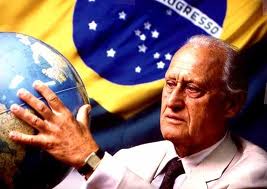By Andrew Warshaw, chief correspondent
April 30 – Joao Havelange, who controlled FIFA for 24 years as he stalked the corridors of power, has resigned as honorary president after being officially denounced for having taken bribes while running the organisation. In a move that will reverberate through football’s world governing body and focus even more public interest and attention on FIFA’s reform process, the veteran Brazilian, now 97, quit what was very much a ceremonial role – but a highly prestigious one – after being discredited in the official report into the infamous ISL scandal.
Havelange, who 18 months ago also quit his membership of the International Olympic Committee, stepped down following long-awaited publication by FIFA’s ethics committee of its findings which finally brought to a close a damaging and destructive saga that has hung over world football’s governing body for 12 years.
Two other former FIFA executive committee members, Ricardo Teixeira – who at one point led Brazil’s 2014 World Cup organisation – and CONMEBOL leader Nicolas Leoz have also been identified as having taken massive World Cup kickbacks in their dealings with ISL. Both have already resigned citing health reasons, Leoz only last week.
Significantly, current FIFA president Sepp Blatter was, as expected, cleared of misconduct during his term of office as general secretary in the 1980s and 1990s.
But the report by FIFA Adjudicatory Chamber chairman Hans-Joachim Eckert described Blatter’s handling of the scandal – involving millions of dollars in payments in exchange for World Cup broadcasting rights – as”clumsy”.
Blatter was quick to issue a statement welcoming that he had been cleared of any wrongdoing.
“I … note with satisfaction that this report confirms that ‘President Blatter’s conduct could not be classified in any way as misconduct with regard to any ethics rules,” he said.
“I have no doubt that FIFA, thanks to the governance reform process that I proposed, now has the mechanisms and means to ensure that such an issue – which has caused untold damage to the reputation of our institution – does not happen again.”
Blatter does not totally emerge from the report unscathed, however, with a suggestion that he might or should have known about the corruption that was taking place – and maybe turned a blind eye.
“It must be questioned… whether President Blatter knew or should have known over the years before the bankruptcy of ISL that ISL had made payments (bribes) to other FIFA officials,” Eckert states.
“The conduct of President Blatter may have been clumsy because there could be an internal need for clarification, but this does not lead to any criminal or ethical misconduct,” he adds.
Although resolved of any culpability, critics of Blatter are bound to question whether he should have maintained a tighter grip on events. Havelange, who was FIFA president from 1974 to 1998, and Teixeira, his former son-in-law, received tens of millions of dollars in improper payments before ISL collapsed into bankrupcy 2001.
The 4,000-page report states: “Mr Havelange has long held solely an honorary position, which does not qualify him as an ‘official’ under the code of ethics. Further, Mr Havelange resigned his position as honorary president effective 18.04.2013.”
Whilst it has long been known that Havelange and Teixeira broke FIFA’s rules, humiliation was piled on to the pair of them by the report. The behaviour of both in their dealings with ISL is lambasted as being “morally and ethically reproachable”.
Although none of those who took payments could be punished since at the time they did not commit any offence under Swiss law, the report stated: “It is clear that Havelange and Teixeira, as football officials, should not have accepted any bribe money, and should have had to pay it back since the money was in connection with the exploitation of media rights.”
“From money that passed through the ISMM/ISL Group, it is certain that not inconsiderable amounts were channelled to Havelange and to his son-in-law Ricardo Teixeira as well as to Nicolas Leoz, whereby there is no indication that any form of service was given in return by the them. These payments were apparently made via front companies in order to cover up the true recipient and are to be qualified as ‘commissions’, known today as ‘bribes’.”
Contact the writer of this story at moc.l1751313401labto1751313401ofdlr1751313401owedi1751313401sni@w1751313401ahsra1751313401w.wer1751313401dna1751313401

